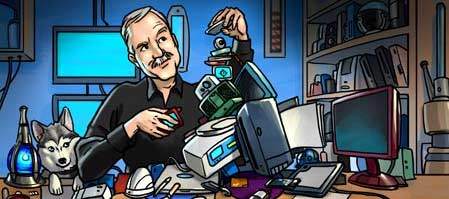In President Obama’s State of the Union Speech last month he spoke of “our Sputnik moment” referring to President Kennedy’s vision that we would reach the moon by the end of the 60’s. It was a wonderful decade to dream and his government was referred to as the Camelot of its time.
But even through the dream was achieved; NASA later became an impediment to the exploitation of space as an unprofitable truck service to near orbit almost eliminating further exploration.
Instead of a stepping stone to intergalactic wonders, it became largely a rusted gate that effectively kept us out of space. It wasn’t that the dream was flawed it was that we lost the dreamer early in the process and no one else could see beyond the initial goal.

For Apple and any company tied to goals that its founder sets forth the problem for those that come after is finding the course because other than the next waypoint it rarely is set.
What if Kennedy, rather than a 10 year vision, had laid out a Century Vision and filled out the part that said the US would find ways to engage industry at key points and increase tax revenues from the related commerce we’d be in better shape today.
While I’m not sure that would work, eventually a future President would change the plan, for Apple going against the wishes of Steve Jobs or Microsoft against the wishes of Bill Gates would be harder even decades after they passed.
Let’s chat about that damned “Vision Thing.”
What is Vision?
In this context it is a destination and it may even include a roadmap in how to get there. Louis Gerstner, the first non-IBM CEO since its founding, was pounded because of his lack of vision and Steve Ballmer at Microsoft is challenged in much the same way.
Even Steve Jobs isn’t visionary, he seems to be expert largely at seeing the potential in ideas from others and then out executing those visionaries. In effect, Steve seems to select from a menu of visions and drives Apple at those he feels are the most compelling. Still, it is hard to argue that this hasn’t been effective given Apple’s success over the last decade.
Now if you go back to the 1920s there was a lot of vision, we had the city of tomorrow, the promise of flying cars, personal robots, and planes and dirigibles that could have been as large as small towns.
Of course very little of that, all of which was supposed to be old news by 2000, actually came to pass and the era of the World’s Fair, where much of this vision came to be, ended along with the fair. Part of the reason the World’s Fair ended is likely because it stopped being a place of wonder and became just another large trade show.
So a Vision isn’t a product is a view of the future that folks find compelling. A good vision is one that comes to pass, likely because that future was driven by the visionary.
The last high profile visionary that was also a top CEO was probably Walt Disney. EPCOT (Experimental Prototype Community of Tomorrow) was supposed to be this city of the future, though clearly dated now, it is still compelling. That vision died with him.
Do We Need a Vision?
I think we do. Visions give us hope for a better tomorrow. If they are thought through they can result in mammoth accomplishments like the Panama Canal, epic voyages to obscure places like the moon, or initially the North American continent.
They give us something big to strive for other than making through another day of work as we march unavoidably to our own demise. They give us a sense of wonder, of hope, of promise of magical things to come.
I think we need another true visionary in a high profile position someone to give us a view of possible future that is worth living and working for. The US President tried but faster internet, better trains, cars that plug in, and fewer potholes might have been a great vision for 1920 but, for today, I think we need something more. China is already doing Maglev trains and planning on deep space exploration.
Wrapping Up: Formula for a Vision
I think that any future vision should have several elements to it. One would be the elimination of the constant fear of some kind of attack, two would be travel that didn’t require invasive searches, three would be a life without the fear of being bullied, four would be a retirement that was worth living to see, five would be the return of substantial personal time to think, play, and enjoy life, and six would be a sense of magic and wonder.
But those would only be part of a vision that might include water and food we could again trust health we could again depend on and a government that really was on our side and not on the side of whoever had the biggest check or the most strident voice.
Utopia might be kind of boring but the alternative of living under constant threats from indeterminate places suggests it is closer to where we want to be than we are.
I think it is time for another Disney like vision, not of the next iPad or electric car, but of the next world. Maybe something like this. What do you think?
ob Enderle is one of the last Inquiry Analysts. Inquiry Analysts are paid to stay up to date on current events and identify trends and either explain the trends or make suggestions, tactical and strategic, on how to best take advantage of them. Currently, he provides his services to most of the major technology and media companies. The opinions expressed in this commentary are solely those of the writer.






